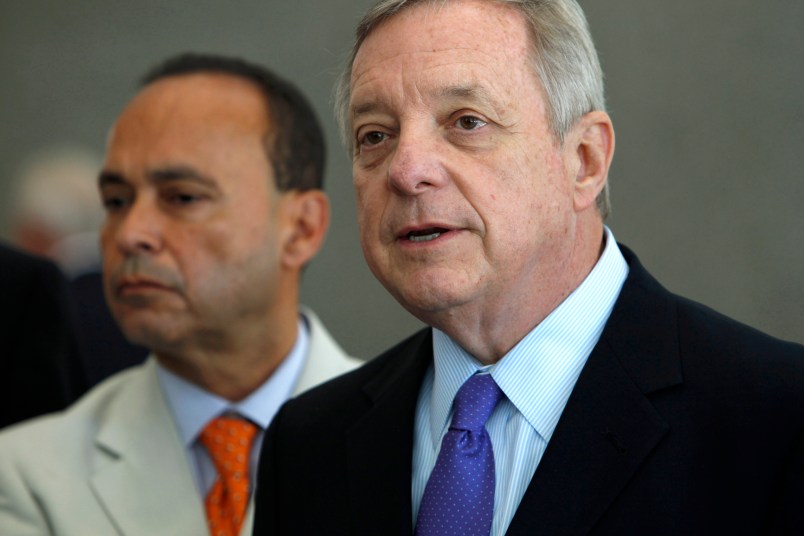Alice Ollstein contributed reporting.
The top Justice Department official who penned the memo that the White House used as justification to fire FBI Director James Comey answered some — but not all — questions from the Senate in a closed door briefing Thursday, senators told reporters afterward.
Deputy Attorney General Rod Rosenstein confirmed that he wrote the May 9 memo after President Trump had declared that he was firing Comey, multiple senators said, but left some of their questions unanswered.
“He did acknowledge that he learned that Comey would be removed prior to him writing his memo,” Sen. Claire McCaskill (D-MO) told reporters.
According to Sen. Corey Booker (D-NJ), Rosenstein would not say who told him at to write the memo.
“He would not completely answer that question,” Booker said. “He definitely talked about the contents of the memo, what his feelings were that made him write the memo, he clarified that the memo was not a legal brief, that it was not a political opinion.”
The White House released the memo, as well as a letter Trump wrote terminating Comey, soon after announcing the shocking decision he would be removed. The Rosenstein memo criticized Comey’s handling of the Hillary Clinton email investigation — and particularly the press conference to announce the recommendation that no charges would be brought — but his memo stopped short of explicitly recommending Comey’s termination.
It has since been reported that Trump had floated the idea of firing Comey before the memo was written, a timeline Rosenstein to a certain degree confirmed, according to the senators in Thursday’s briefing.
“He wouldn’t go into detail about the President’s May 8 declaration that he was going to fire Comey – he didn’t give us any detail on that. On May 9, he wrote his memo,” Sen. Dick Durbin (D-IL) told reporters.
On Wednesday evening, the Department of Justice announced that Rosenstein had appointed former FBI Director Robert Mueller to serve as special counsel on the Russia-Trump investigation, a decision many Democrats praised coming out of the briefing with Rosenstein Thursday.
Senators said that they got the signal that Mueller has been given wide-breadth in his investigation and that is why Rosenstein was unable to answer many of their questions, including those about the Comey firing.
“He was prepared to talk about the reasons he gave in his memo, but he was not prepared to talk about any of the other circumstances surrounding the firing of James Comey out of his belief that it could come under the purview Mueller’s investigation,” Sen. Chris Murphy (D-CT) said. That included details about conversations Rosenstein had with Trump and reasons Trump may have gave in his decision to remove Comey.
Yet Democrats were also still frustrated with the Rosenstein’s explanation, or lack thereof, for why he wrote the memo.
“It’s a curious explanation,” Sen. Kamala Harris (D-CA) said, of the timeline for the memo. “It certainly leaves unanswered questions.”
Sen. Jeff Merkley (D-OR) told reporters that Rosenstein had “no understanding that his memo was used as a coverup.”
“Or he doesn’t want to take any accountability for it,” Merkley told reporters. “Maybe somebody else found something useful in that. But I didn’t.”
Durbin, however, stressed that the general lack of answers from Rosenstein was reflective of the space he was giving Mueller.
“There’s obviously questions related to the investigation and he doesn’t want to jeopardize the investigation. He painted with a pretty broad brush in terms of possibilities, but he left it to Director Mueller to decide the scope of the investigation,” Durbin told reporters.
Later on in the scrum, he was asked again whether Rosenstein left a lot unanswered questions.
“He did and I am trying to tell you why. He believes the scope of Mueller’s investigation is so broad, with so many questions, so many areas that may or may not lead to criminal prosecution, that there were many things that he didn’t want to comment on,” Durbin said.







Rosenstein supposedly had a very good reputation prior to joining the Trump administration. It appears that his good reputation was not well deserved as he acts like an incompetent tool. Here’s what Senator Harris had to say about Rosenstein’s competence or lack there of.
http://www.msnbc.com/andrea-mitchell-reports/watch/sen-kamala-harris-weighs-in-on-comey-firing-flynn-reports-947374147998
Drip. Drip drip drip. I’ve seen the instant hot takes about Rosenstein. Better to wait and see what’s revealed. [popcorn gif]
(Yes, yes, this kind of “wait and see” attitude is total opposite of my take on those who, in November, saw Trump win the presidency and took a “wait and see what he does” attitude while I was saying, OMG! Authoritarianism! Grifting from the Oval Office! To the barricades!)
Well, this guy’s reputation is now in the toilet !
Rosenstein essentially stabbed Comey in the back - for no reason, other than he wanted to???
So much for another of Trump’s toadies.
“What’s that?"
“The laundry basket?”
“No, next to it.”
“I don’t see anything next to it.”
"It’s my last shred of dignity. It’s very small.”
― John Green, The Fault in Our Stars
Everything that comes into close contact with T***p turns into shit. Including reputations.